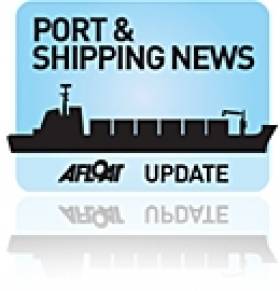Displaying items by tag: Cork's 'Banana Boats'
#MaerskBananaBoats – The excellent high adrenaline Oscar nominated film 'Captain Phillips' about the pirated containership Maersk Alabama (1998/14,120grt), saw a fleetmate of the US flagged vessel dock to unload bananas in the Port of Cork, writes Jehan Ashmore.
The Maersk Norfolk (2006/26,671grt) berthed at Ringaskiddy Deepwater Terminal and as previously reported on Afloat.ie, Maersk Line launched the liner service just more than a year ago in February 2013. Then the inaugural caller was made by Maersk Nolanville (2004/26,833grt) and she became the first such 'banana-boat' to trade to Cork Harbour since the 1970's. She was one of the largest vessels of her type to berth at the lower Cork Harbour terminal.
The liner service is operated by a pool of eight containerships and is the first ever direct service to Ireland by the Maersk Line, Limited (MLL) which is an American company, headquartered in Norfolk, Va. This company are part of the Maersk Group which is controlled by the giant Danish owned A. P. Møller-Mærsk A/S headquartered in Copenhagan.
Maersk Line bring leading banana brands from Central American ports to Europe and Cork being the first port of call, where last month the Port of Cork unveiled plans to redevelop the Ringaskiddy terminal by presenting a 3D Real Simulated Model interactive display and a public consultation.
This latest call to Cork Harbour by Maersk Norfolk involves a liner service starting in Vera Cruz, Mexico and included calls to Costa Rica, Belize, Panama, before reaching the rebel county port.
This evening the 210m Maersk Norfolk is scheduled to depart on the next leg to Tilbury and eventually to Rotterdam.
The Thames Estuary of Tilbury port has been rebranded the London Container Terminal (LCT) in face of its nearest downriver competitor, that is the new 'super-port' of the London Gateway owned by DP World. The state-of-the-art facility is a highly automated deep-sea container port.




























































